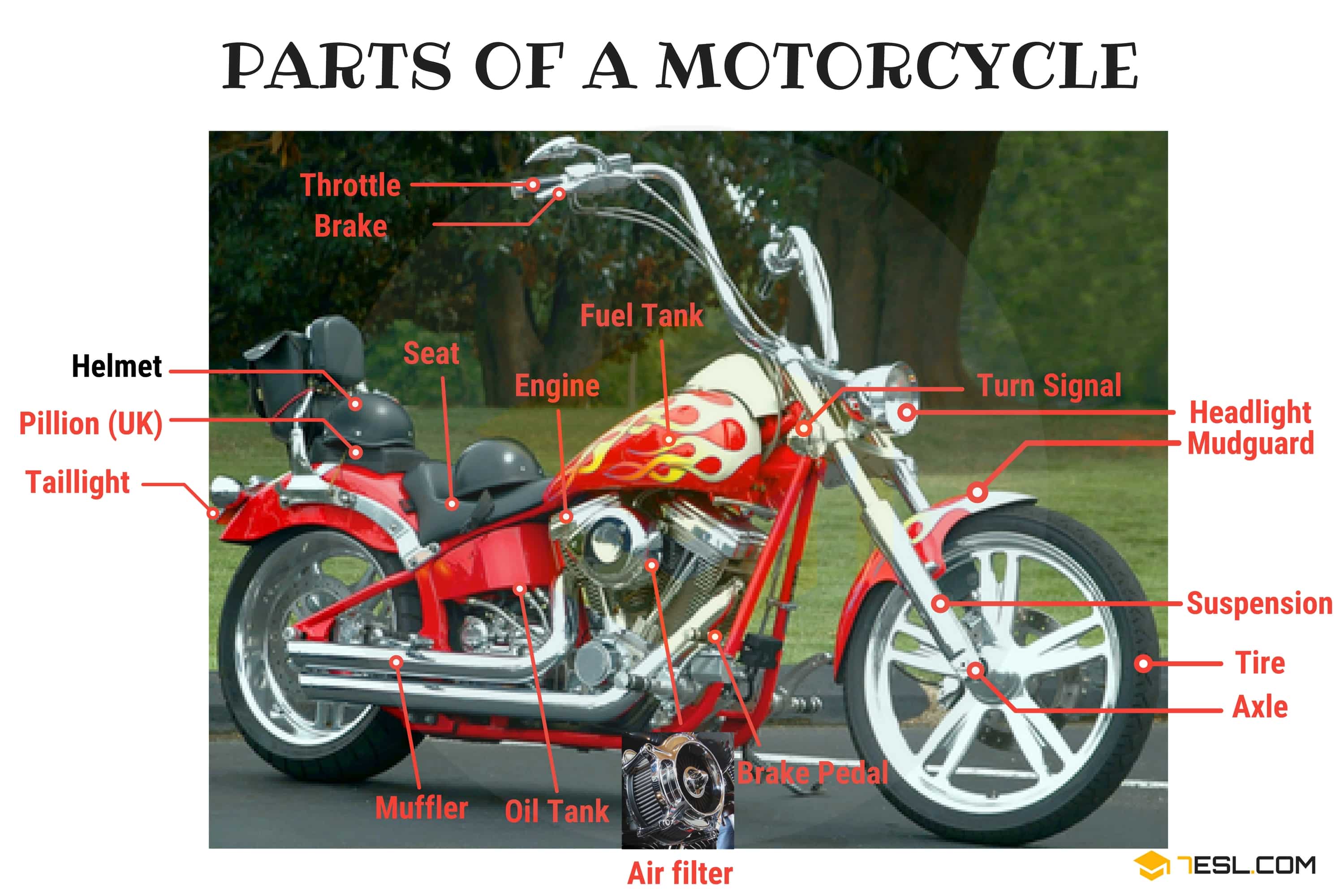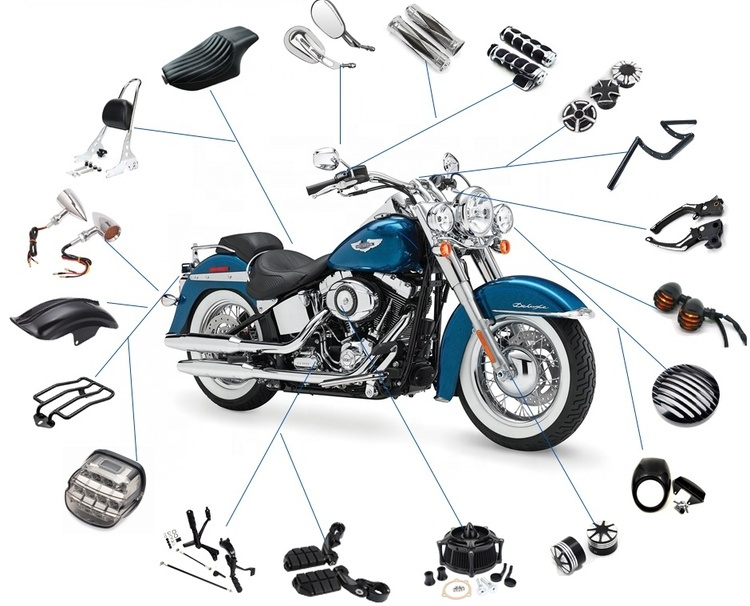Most Commonly Replaced Motorcycle Parts Auckland for Riders in Auckland
Most Commonly Replaced Motorcycle Parts Auckland for Riders in Auckland
Blog Article
Discover the Crucial MotorBike Components You Required for Optimum Efficiency
Understanding the crucial parts of a bike is basic for attaining peak performance. Each component, from the engine to the braking system, plays a vital role in general capability and safety and security. Normal maintenance can avoid unexpected failings and enhance the riding experience. Nonetheless, numerous riders overlook the ins and outs of these systems. Discovering just how they interact can cause a much more reliable experience. What crucial components should every biker focus on?
The Engine: The Heart of Your Motorbike
The engine offers as the core part of a bike, driving its efficiency and specifying its capabilities. It is accountable for converting gas into power, which powers the bike onward. Different sorts of engines are used, including single-cylinder, V-twin, and inline configurations, each offering distinct features suited for different riding purposes and styles. The engine size, typically measured in cubic centimeters (cc), substantially influences efficiency, with bigger engines normally providing even more power and torque.Furthermore, the engine's style and innovation, such as gas injection systems or air-cooling versus liquid-cooling, affect efficiency and reliability. Maintenance is crucial for peak procedure; elements like normal oil adjustments and checking trigger plugs assurance long life. Bikers usually consider an engine's responsiveness and smoothness, as these characteristics enhance the general riding experience. Inevitably, the engine continues to be an essential element that defines not only the motorcycle's efficiency but likewise the rider's link to the equipment.
The Transmission: Shifting Gears Smoothly
The transmission plays a vital role in a motorcycle's performance, specifically in the mechanics of equipment changing. Understanding just how to change gears smoothly can enhance the total riding experience, while normal maintenance warranties peak performance. Correct focus to these elements can substantially influence the long life and performance of the motorbike.

Equipment Shifting Mechanics
Smooth equipment moving is crucial for excellent motorcycle efficiency, significantly influencing both acceleration and control. The mechanics of gear shifting include the interaction between the clutch, equipment lever, and transmission system. When a motorcyclist involves the clutch, it disengages the engine from the transmission, enabling a gear change without harming the parts. A well-timed release of the clutch, incorporated with exact activity of the equipment bar, facilitates a smooth modification in between gears. This process guarantees that the engine operates within its finest power band, improving efficiency. Oem Parts New Zealand. Furthermore, recognizing the gear ratios and their effect on speed and torque can help motorcyclists make notified options throughout shifts, eventually adding to a much more delightful and receptive riding experience
Maintenance Tips Value
Routine upkeep plays a crucial duty in guaranteeing that the transmission system runs successfully, enabling smooth equipment shifts. Frequently altering the transmission and checking fluid is essential, as old liquid can lead to boosted friction and wear. In addition, inspecting the clutch for wear guarantees peak interaction and disengagement, avoiding slippage during gear adjustments. Lubrication of moving parts is similarly important to lower rubbing and boost efficiency. Bike proprietors should likewise check for leakages and uncommon sounds, as these can suggest underlying concerns. By sticking to these maintenance tips, cyclists can lengthen the lifespan of their transmission system, ensuring that gear changes continue to be smooth and adding to the total efficiency of their motorcycle.
The Braking System: Ensuring Safety on Every Experience
Braking systems are basic components that straight affect a motorcycle's security and performance. They contain various parts, consisting of brake pads, blades, calipers, and hydraulic lines, all interacting to guarantee reliable deceleration. The sort of stopping system-- normally either disc or drum-- affects responsiveness and quiting power.Regular upkeep is important to maintain peak efficiency; used brake pads can result in reduced performance and increased stopping distances. In addition, the top quality of brake liquid must be kept track of, as it can take in dampness with time, jeopardizing braking efficiency.Riders must also take into consideration the relevance of anti-lock stopping systems (ABDOMINAL MUSCLE), which prevent wheel lockup throughout sudden stops, improving total security. Appropriately working brakes are not nearly stopping; they instill self-confidence in the rider, enabling much safer navigating through different surfaces. Eventually, a reliable stopping system is critical for taking pleasure in every ride with comfort.
The Suspension: Enhancing Convenience and Control
A well-functioning suspension system substantially adds to a motorcycle's total efficiency, matching the performance of the braking system. The suspension plays a considerable role in taking in shocks from uneven surface areas, assuring a smoother experience while keeping tire contact with the road. This link contact is essential for both security and control, enabling motorcyclists to browse edges with self-confidence and precision.Different kinds of shock absorber, such as telescopic forks or mono-shocks, supply varying levels of comfort and handling. Correctly tuned suspension improves responsiveness, offering the cyclist with a more linked feel to the motorbike. Routine maintenance checks are essential to identify the suspension components, consisting of springtimes and dampers, are operating at their best. An efficient shock absorber not only elevates the riding experience however additionally adds to the durability of other motorbike parts by minimizing damage. Because of this, purchasing top quality suspension is vital for any major motorcycle fanatic.
The Tires: Connecting You to the Roadway
Tires play a necessary duty in a motorcycle's efficiency, functioning as the key link between the rider and the road. Recognizing the various sorts of tires offered can substantially impact dealing with and security. Additionally, normal maintenance is essential to ensure peak tire efficiency and longevity.
Tire Types Explained
How do various tire kinds affect a motorbike's efficiency? Tire types play a crucial role in establishing a motorbike's stability, handling, and grasp. Sporting activity tires, developed for high performance, offer boosted traction and responsiveness on paved roads, making them optimal for racing and hostile riding. Alternatively, touring tires prioritize durability and convenience, giving a smoother trip for long-distance travel. Off-road tires, characterized by their rugged tread patterns, master traction on unpaved surface areas, ideal for adventure enthusiasts. Furthermore, dual-sport tires blend features from both on-road and off-road categories, accommodating versatile riding demands. Inevitably, choosing the best tire type is necessary for optimizing efficiency, making certain safety and security, and enhancing the general riding experience.
Upkeep Tips Offered
While riding when traveling, maintaining excellent tire condition is essential for security and performance. Regularly checking tire pressure is essential, as under-inflated tires can result in poor handling and boosted wear. It is a good idea to evaluate step depth often; worn tires concession grasp and security. On top of that, bikers need to look for indicators of damage, such as fractures or lumps, which can suggest the need for substitute. Turning tires occasionally guarantees even use, improving long life. Maintaining tires clean from particles and avoiding too much curbs can prolong their lifespan. Maintaining appropriate alignment and equilibrium contributes to come to a head efficiency, minimizing stress and anxiety on other bike parts. Following these maintenance pointers will greatly boost the total riding experience.
The Fuel System: Fueling Performance and Effectiveness
The fuel system plays an important role in making the most of a motorbike's performance and efficiency, as it assures the optimal shipment of gas to see this website the engine. It makes up a number of crucial parts, consisting of the fuel container, gas pump, fuel filter, and fuel injectors or carburetor. Each component must function effectively to ensure a powerful and smooth ride.The gas storage tank stores fuel and provides it to the engine through the fuel pump, which generates the required stress. A fuel filter stops pollutants from going into the engine, while the injectors or carburetor mix fuel with air for combustion.Proper upkeep of the gas system is important; a blocked filter or malfunctioning injector can bring about lowered efficiency and boosted fuel usage. By confirming that the gas system operates look what i found effectively, bikers can take pleasure in better throttle response, better fuel economic situation, and in general improved riding experience.
The Electrical System: Powering Your Adventure
An effective electric system is vital for the total performance and security of a motorbike, as it powers important components such as the ignition, lighting, and numerous digital systems. This system consists of the battery, which stores power, and the alternator, liable for generating power while the engine runs. The circuitry harness attaches these components, making sure reliable power distribution.Additionally, merges secure the system from overloads, while relays aid regulate high-current tools with low-power signals. A well-maintained electric system enhances performance by making sure smooth begins and regular operation of signals and lights, crucial for motorcyclist visibility and safety.Regular checks of the battery's fee and connections are very important for stopping electrical failures. Motorcyclists should also inspect circuitry for deterioration, making certain all components operate preferably. Eventually, a durable electric system adds significantly to the total performance and integrity of the motorcycle.
Frequently Asked Questions
How Usually Should I Replace My Motorcycle's Battery?
The regularity of bike battery substitute depends on use and maintenance (Bike Parts Wellington). Generally, batteries ought to be replaced every 3 to five years. Regular checks can help identify when a substitute is required for peak performance
What Tools Do I Need for Fundamental Bike Upkeep?
For standard bike upkeep, one calls for necessary devices such as an outlet set, wrenches, screwdrivers, pliers, tire stress scale, and a torque wrench. These tools assist in efficient upkeep and guarantee the motorbike runs successfully and securely.
Exactly How Can I Enhance My Motorcycle's Aerodynamics?
To boost bike aerodynamics, one need to consider adjusting fairings, making use of windshield expansions, optimizing body setting, and lowering general weight. These adjustments assist reduce drag, enhancing stability and gas effectiveness during rides.
What Are the Signs of a Failing Electric System?
Indicators of a failing electric system include lowering lights, problem starting, uneven instrument readings, and blown fuses. Motorbike Components NZ. Uncommon smells or deterioration around battery terminals might also show underlying concerns requiring instant attention for safety and security and efficiency

Just how Do I Choose the Right Oil for My Bike?
When picking oil for a bike, one should take into consideration the manufacturer's requirements, thickness rankings, and the type of riding. In addition, traditional versus synthetic oil can affect performance and engine protection, influencing the choice significantly. The engine dimension, usually gauged in cubic centimeters (cc), substantially affects performance, with bigger engines normally offering even more power and torque.Furthermore, the engine's layout and innovation, such as gas injection systems or air-cooling versus liquid-cooling, affect effectiveness and reliability. A well-functioning suspension system greatly adds to a motorbike's total performance, enhancing the performance of the braking system. The gas system plays an important duty in maximizing a motorcycle's performance and effectiveness, as it ensures the optimal shipment of fuel to the engine. A gas filter prevents contaminants from getting in the engine, while the injectors or carburetor mix fuel with air for combustion.Proper upkeep of the gas system is important; a clogged filter or malfunctioning injector can lead to reduced efficiency and enhanced gas usage. A properly maintained electrical system boosts performance by ensuring smooth begins and regular procedure of lights and signals, important for cyclist exposure and safety.Regular checks of the battery's charge and links are important for stopping electrical failures.
Report this page